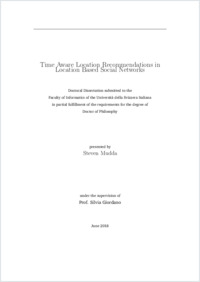Time aware location recommendations in location based social networks
- Mudda, Steven
- Giordano, Silvia (Degree supervisor)
-
26.06.2018
184 p
Thèse de doctorat: Università della Svizzera italiana, 2018
Location recommendation
Location based social networks
Deep learning
Call detail records based recommendation
English
Smartphones have fundamentally changed how people make choices about the products and services they consume and the way they interact with each other. The spread and extensive usage of mobile applications has led to the rise of Location-based Social Network (LBSN) services like Foursquare, Yelp etc, that aim to aim to provide new and novel places of interest to people based on their interests and habits. A Recommendation system helps users to discover places they may like and also enable them to narrow down their choices. In particular, providing relevant location recommendations to users is essential to drive customer engagement with the mobile application and is also an important research topic. Multiple studies on human mobility patterns and my analysis on different LBSN datasets have shown that the preference of users for different locations changes with time, i.e., type of locations visited in the afternoon are different from those visited in the evening. Majority of recommendation systems in LBSN do not take into account the temporal aspect of recommendation. A recommendation system must be able to provide locations to users by taking into account their 1) stationary preferences that don't change with time and 2) temporal preference that differ with time and recommended locations that are relevant in time to the user. This thesis first presents a feature based location recommendation model, REGULA that exploits the regular mobility behavior of people and incorporates temporal information to provide better location recommendations. REGULA outperforms other feature and graph-based location recommendation models. Further, this thesis presents the first model to recommend interesting areas to people based on their Call Detail Records. Finally, this thesis presents two deep neural network based location recommendation models ( DEEPREC and DEEPTREC ) that are used to learn the stationary and temporal preferences of users. The combined model ( JOINTDEEPREC ) can be used to provide time-aware location recommendations to people. The model was evaluated on one of the largest check-in dataset collected at Microsoft Research Asia and outperforms state-of-the-art model by a factor of 10.
- Language
-
- English
- Classification
- Computer science and technology
- License
-
License undefined
- Identifiers
-
- RERO DOC 323112
- URN urn:nbn:ch:rero-006-117662
- ARK ark:/12658/srd1318875
- Persistent URL
- https://n2t.net/ark:/12658/srd1318875
Statistics
Document views: 367
File downloads:
- Texte intégral: 304
